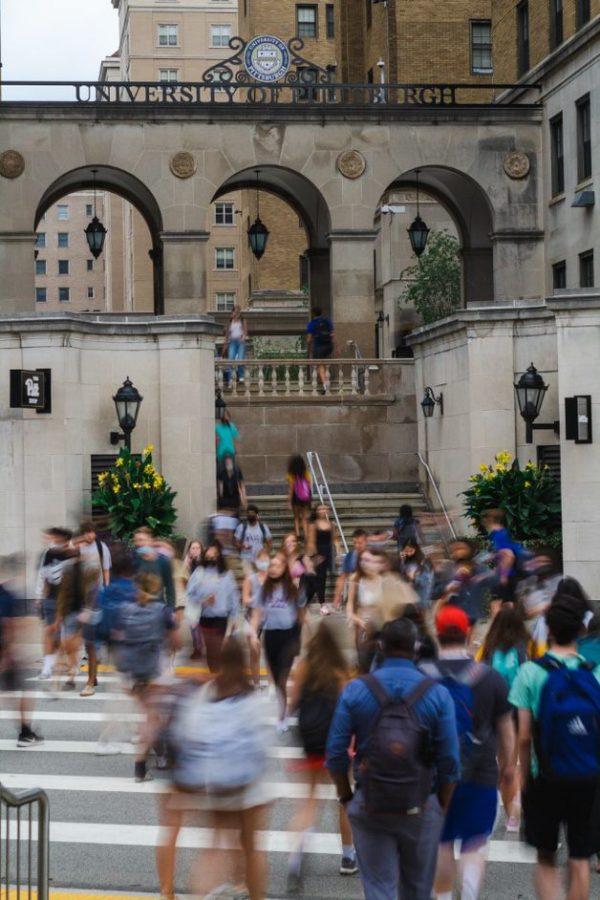Pitt underclassmen finish up first fully in-person first semester
John Blair | Senior Staff Photographer
Students cross Forbes Avenue between classes in September.
December 8, 2021
After a year of online learning due to the COVID-19 pandemic, first-year and sophomore Pitt students are about to complete their first ever semester of college in person. Some of these students, like Gabby Guerrini, found it difficult to find motivation for schoolwork after experiencing a very laidback virtual senior year of high school.
“Last year I did not have to do anything in school, basically. You could get by with excuses and most teachers barely assigned any work,” Guerrini, a first-year finance major, said. “When you did have work, everyone cheated on it.”
Guerrini said the typical transition from high school to college became especially difficult with the added stress of going back to class in person.
“I had to reacclimate myself to sit down and do work, and focus in class,” Guerrini said. “I really haven’t had to do that in two years.”
Pitt classes operated virtually for two weeks at the start of the fall semester. After those two weeks, all courses became required to be held in person. Pitt sophomores are experiencing in-person learning for the first time since the pandemic caused the University to switch to a virtual setting in March 2020, and first-year students are experiencing their first in-person college classes. Moving back in person this semester caused many challenges for some students, both socially and academically, but also brought hope for normalcy and a more pre-pandemic experience.
Similarly to Guerrini, Ashley Feiler, a sophomore English writing and linguistics double major, ran into trouble adjusting back to in-person classes. Feiler experienced her first year at Pitt entirely virtual, and said her professors made many modifications last year to assignments, such as open-note tests and flexible due dates, which are no longer offered.
“That was my first experience of a college class, and it was a bit of a shock this semester when those rules weren’t the case all of the time,” Feiler said.
Feiler said some of her professors offered a Zoom option, but could only be used if students were not feeling well, as a way to make the course “as accessible as possible.”
When Feiler went fully in person, she said a year of isolation made it challenging to try and meet new people and connect with her classmates.
“I felt like I didn’t really know how to do that this year, but I figured it out eventually. I wasn’t sure if I should try and strike up a conversation with the person sitting next to me or not,” Feiler said. “These are things you normally go through as a freshman, but I felt like I was supposed to have it figured out already because I am a sophomore.”
Liz Scabilloni, a first-year undecided student on the pre-physician assistant track, said this semester served as a “wake-up call.”
“Before this year, I was so used to doing things online, doing things at the last minute or sometimes not doing things at all,” Scabilloni said. “It’s definitely been a little bit of a struggle trying to work up a work ethic.”
Scabilloni said her professors did not give a lot of homework, which made that transition slightly easier. She said her biology course was the most demanding, but wasn’t overwhelming.
“For biology, I have a pre-class assignment before every lecture and a homework assignment due every Friday, but that’s the most,” Scabilloni said. “All of my other classes don’t have a lot of homework, probably about once every couple weeks.”
Unlike Scabilloni, Feiler experienced a much heavier workload at 18 credits. She said her courses required many hours of homework completion and studying, and she is looking forward to spring semester.
“I don’t think I have necessarily adjusted perfectly yet, so this semester was definitely difficult,” Feiler said. “I think next semester will be a lot better because I’m more used to how things are going to look.”



